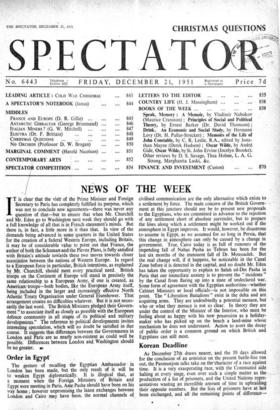Korean Deadline
As December 27th draws nearer, and the 30 days allowed for the conclusion of an armistice on the present battle-line run out, the Panmunjom talks take on the character of a race against time. It is a very exasperating race, with the Communist side halting at every stage, even over such a simple matter as the production of a list of prisoners, and the United Nations repre- sentatives wasting an incredible amount of time in upbraiding their opposite numbers. But the lists of prisoners have at last been exchanged, and all the remaining points of difference- superyision of the truce, rotation of United Nations troops, saner- vision of frontier movements and the control of islands off the coast—are of the kind that could be settled in a week, or less, if both sides really want to settle them. Still the nagging suspicion that the Communists will ask for an extension of the time allowed for negotiation persists, and the flat statement of Brigadier- General Nuckols that it would not in any case be granted may yet prove to be an advance signal for the resumption of large- scale fighting. Yet militarily the United Nations commander has little room for concessions. The point about fixing a time-limit of 30 days was that a longer period of quiet would greatly increase the danger of a Communist build-up in preparation for a new attack. It is difficult, in any case, to see how the lull of the past month could be prolonged. Already General Nuckols has announced that the indulgence shown by allied aircraft to un- marked vehicles moving between Pyongyang and Kaesong, on the Communist side of the proposed cease-fire line, is to end at once. A resumption of fighting in the middle of winter, merely because of a few technical difficulties in the talks at Panmunjom, is a bitter prospect. But there is still time to avert it.



































 Previous page
Previous page